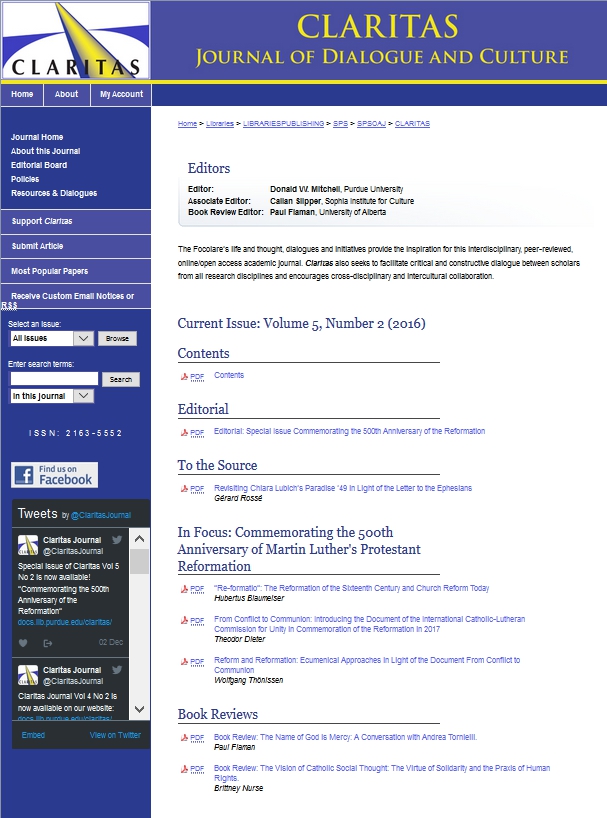 Courageous impulse towards ecumenical commitment. Catholics and Lutherans can walk together on a path towards a full reconciliation. 500 years have passed since Luther’s Reformation movement, the commemoration of which will last a year, starting from 30 October last year to 31 October 2017 (a symbolical date that recalls the publication in 1517, of the Ninety-Five theses of Luther on indulgences and justification, in Wittenberg). Inauguration events started with a meeting in the Lutheran Cathedral of Lund in Sweden, between Bishop Munib Younan, President of the World Lutheran Federation, and Pope Francis. On that occasion, the Pope had invited all Christians united by baptism, to announce together the Word of God, putting an end to all the century-old theological disputes that had separated the two Churches, and underlining the common gifts received thanks to dialogue and mutual listening. The Italian journal Nuova Umanità (New Humanity) dedicated its 221st edition to this event, focusing on the work entitled, “Half a millennium after Luther” (published in March 2016). Curated by Hubertus Blaumeiser, it presents the essays of a Lutheran theologian, Theodor Dieter, and a Catholic theologian, Wolfgang Thönissen. The historically important Lund event was preceded by the document, “From conflict to communion,” published in 2013 by the Lutheran–Catholic Commission for Unity, which works on behalf of the World Lutheran Federation and the Pontifical Council for the promotion of unity among Christians. The text indicates five “ecumenical imperatives” to definitively overcome the causes of disagreements and live a season of common commitment in mutual trust. The First imperative: Catholics and Lutherans strongly united by baptism should start always from the perspective of unity and not from the point of view of division, to strengthen what they have in common, instead of underlining and experiencing differences. The Catholic and Lutheran Churches, in the course of history have defined themselves through disagreements. Now there is need of the contrary, of the experience of encouragement and reciprocal criticism. Then comes the second imperative: continually letting oneself be transformed by the encounter with the other and the reciprocal witness of faith, through dialogue that opens to various ways and degrees of communion. The Third: renewed commitment of oneself to seek visible unity and elaborate and develop together the concrete steps this implies, and constantly strive towards this objective. The Fourth: rediscover together the power of the Gospel of Jesus Christ for our time. And lastly the fifth: the missionary task of ecumenism becomes greater inasmuch as our societies become pluralistic from the religious standpoint, and this is why together we have to bear witness to God’s mercy in the Gospel announcement and service to the world. The report ends by saying: «The beginnings of the Reformation will be remembered in an adequate and just manner when Lutherans and Catholics will listen to the Gospel of Jesus Christ together, and will once again let themselves be called to form a community together with the Lord.» The genesis and development of such a document was deepened in edition 223 of New Humanity, dedicated specifically to this decisive step for ecumenism. Following the trail of the Lund event and as a logical consequence of the “theoretical” answer given by the Ecumenical Council of Churches, at the end of February in the town of Ottmaring and characterised by an outstanding ecumenical calling, the President and Co-President of the Focolare, in the name of the entire Movement undertook the commitment to testify to and work for communion between the Churches beyond all divisions. «As a global movement with many members who are Christians of many Churches, and which is thus already living the experience of a people united by mutual love […] we recognise in the Lund meeting a true and proper kairos, a sign of God for our time, which pushes Christians to commit themselves even more, to make the testament of Jesus – that all may be one – a reality. »
Courageous impulse towards ecumenical commitment. Catholics and Lutherans can walk together on a path towards a full reconciliation. 500 years have passed since Luther’s Reformation movement, the commemoration of which will last a year, starting from 30 October last year to 31 October 2017 (a symbolical date that recalls the publication in 1517, of the Ninety-Five theses of Luther on indulgences and justification, in Wittenberg). Inauguration events started with a meeting in the Lutheran Cathedral of Lund in Sweden, between Bishop Munib Younan, President of the World Lutheran Federation, and Pope Francis. On that occasion, the Pope had invited all Christians united by baptism, to announce together the Word of God, putting an end to all the century-old theological disputes that had separated the two Churches, and underlining the common gifts received thanks to dialogue and mutual listening. The Italian journal Nuova Umanità (New Humanity) dedicated its 221st edition to this event, focusing on the work entitled, “Half a millennium after Luther” (published in March 2016). Curated by Hubertus Blaumeiser, it presents the essays of a Lutheran theologian, Theodor Dieter, and a Catholic theologian, Wolfgang Thönissen. The historically important Lund event was preceded by the document, “From conflict to communion,” published in 2013 by the Lutheran–Catholic Commission for Unity, which works on behalf of the World Lutheran Federation and the Pontifical Council for the promotion of unity among Christians. The text indicates five “ecumenical imperatives” to definitively overcome the causes of disagreements and live a season of common commitment in mutual trust. The First imperative: Catholics and Lutherans strongly united by baptism should start always from the perspective of unity and not from the point of view of division, to strengthen what they have in common, instead of underlining and experiencing differences. The Catholic and Lutheran Churches, in the course of history have defined themselves through disagreements. Now there is need of the contrary, of the experience of encouragement and reciprocal criticism. Then comes the second imperative: continually letting oneself be transformed by the encounter with the other and the reciprocal witness of faith, through dialogue that opens to various ways and degrees of communion. The Third: renewed commitment of oneself to seek visible unity and elaborate and develop together the concrete steps this implies, and constantly strive towards this objective. The Fourth: rediscover together the power of the Gospel of Jesus Christ for our time. And lastly the fifth: the missionary task of ecumenism becomes greater inasmuch as our societies become pluralistic from the religious standpoint, and this is why together we have to bear witness to God’s mercy in the Gospel announcement and service to the world. The report ends by saying: «The beginnings of the Reformation will be remembered in an adequate and just manner when Lutherans and Catholics will listen to the Gospel of Jesus Christ together, and will once again let themselves be called to form a community together with the Lord.» The genesis and development of such a document was deepened in edition 223 of New Humanity, dedicated specifically to this decisive step for ecumenism. Following the trail of the Lund event and as a logical consequence of the “theoretical” answer given by the Ecumenical Council of Churches, at the end of February in the town of Ottmaring and characterised by an outstanding ecumenical calling, the President and Co-President of the Focolare, in the name of the entire Movement undertook the commitment to testify to and work for communion between the Churches beyond all divisions. «As a global movement with many members who are Christians of many Churches, and which is thus already living the experience of a people united by mutual love […] we recognise in the Lund meeting a true and proper kairos, a sign of God for our time, which pushes Christians to commit themselves even more, to make the testament of Jesus – that all may be one – a reality. »
Place yourself at the service of others
Place yourself at the service of others




0 Comments